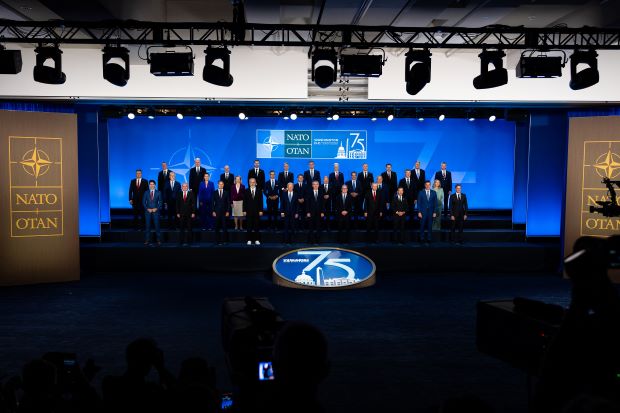For first time, NATO accuses china of supplying Russia’s attacks on Ukraine

By David E. Sanger
WASHINGTON — After decades of viewing China as a distant threat, NATO on Wednesday (10) accused Beijing of becoming “a decisive enabler of Russia’s war against Ukraine”, and demanded that it halt shipments of “weapons components” and other technology critical to the rebuilding of the Russian military.
The statement is contained in a declaration approved by the 32 leaders of the alliance, shortly before they headed to a dinner at the White House on Wednesday night. It is a major departure for NATO, which until 2019 never officially mentioned China as a concern, and then only in the blandest of language.
Now, for the first time, the alliance has joined in Washington’s denunciations of China’s military support for Russia.
But the declaration contains an implicit threat that China’s growing support for Russia will come at a cost. China “cannot enable the largest war in Europe in recent history without this negatively impacting its interests and reputation,” the declaration said, particularly calling out “its large-scale support for Russia’s defence industrial base”.
The NATO declaration did not specify what those costs would be, although the natural first step would be economic sanctions that barred China from parts of global markets.
Even a year ago, European leaders were hesitant to challenge Beijing, especially nations like Germany that view China as a critical market for high-end cars and luxury goods.
Many European leaders initially dismissed the agreement reached in early 2022, just before the Beijing Olympics, for a “partnership without limits” signed by Russian President Vladimir Putin and Chinese President Xi Jinping. Even President Joe Biden said he had his doubts that the two countries, with a long history of enmity, could work together. In March 2023, during a trip to Canada, he said, “I think we vastly exaggerate” the partnership.
“I’ve been hearing now for the past three months about ‘China is going to provide significant weapons to Russia and they’re gonna’ — a lot of talk about that,” Biden added. “They haven’t yet. Doesn’t mean they won’t, but they haven’t yet.”
But 29 months after the invasion of Ukraine, that view has changed drastically. While China has heeded warnings not to supply Russia with full weapons systems, it has done everything short of that, providing computer chips, advanced software and the components needed for Russia to rebuild a defence industrial base that churned out faulty and outdated equipment.
The intelligence evidence was provided to NATO countries by the Biden administration, in an effort to win over sceptics who argued that China was not a central player in the war. That succeeded, but only after the United States published the names, in a Treasury Department economic sanctions order, of Chinese front companies and manufacturers that were funnelling the technology to Russia.
“The declaration demonstrates that NATO allies now collectively understand this challenge and are calling on the PRC to cease this activity,” Jake Sullivan, Biden’s national security adviser, said Wednesday afternoon, referring to the People’s Republic of China. “If this PRC support continues, it will degrade its relations across Europe, and the United States will continue to impose sanctions on PRC entities involved in this activity, in coordination with our European allies.”
The declaration also blames China for “malicious cyber and hybrid activities, including disinformation” aimed at the United States and Europe. This week, the United States and several of its allies warned of a hacking group linked to China’s Ministry of State Security that appears to be focused on stealing well-protected government and commercial secrets. White House officials have spent much of the past few years focused on a different group that it has charged with planting malware in critical US infrastructure, which could be activated to cut off pipelines and electric grids in a confrontation over Taiwan.
China has denied that it is preparing for cyberattacks or that it is a major factor in the war in Ukraine. Chinese officials have, publicly and privately, accused Washington of deep hypocrisy, noting the tens of billions of dollars in ammunition, missile systems, tanks and soon F-16 jets that the United States is giving to Ukrainian fighters.
In May, when American sanctions were imposed, Wang Wenbin, a spokesperson for the Chinese Foreign Ministry, called the US accusations “hypocritical and highly irresponsible”. But he did not deny the specifics.
The standoff over China’s role in Ukraine is threatening to unwind whatever goodwill Biden developed with Xi when they met in November in California. At the time, Biden warned him privately about interfering in the 2024 presidential election, but the evidence was not yet available that China was becoming a major force, alongside Iran and North Korea, in supplying the Russian war effort.
For China, the move to aid Russia’s invasion of Ukraine is relatively new. The weekend before the full-scale invasion began in February 2022, China’s top foreign policy official, Wang Yi, told the Munich Security Conference that Beijing respected the sovereignty of independent nations, including Ukraine. But now it is making little secret of its support for Russia’s effort to wipe the country off the map and integrate its territory.
Since then, China’s number of joint projects with Russia, including military exercises, has been striking. Xi and Putin have met about 50 times as presidents. And their joint effort with Europe to contain the growth of North Korea’s nuclear arsenal and prevent Iran from taking a similar path has been abandoned.
-New York Times


Comments are closed, but trackbacks and pingbacks are open.